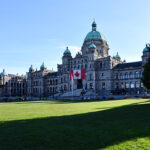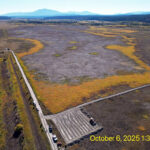Home »

Finance Minister touts ‘new reality’ budget to chamber
Provincial Finance Minister Kevin Falcon delivered an upbeat message to a packed Heritage Inn ballroom Cranbrook Chamber of Commerce audience today (Feb. 27), as he broke down his recently unveiled “new reality” budget.
“We delivered a budget in a context,” he said, which is focused on “a new reality” – namely the sweeping changes to the world’s economy in the past four years.
Falcon’s message mirrored a Ministry of Finance Budget 2012 highlights handout, called ‘Fiscal discipline for a stable economy,’ along with the sub-header “The province’s future prosperity depends on watching our spending today.”
Falcon’s budget aims to take B.C. back to balanced books by 2013-14, as promised during the last election, though this year will see the province run an estimated $968-million deficit, including the heaping sum ($1.6 billion) that must be paid back to the Federal Government following the defeat of the Harmonized Sales Tax.
But the province could be in much worse shape, he said, noting B.C. is in an elite category in terms of its Standard and Poors Credit Rating – a sparking Triple A – the same as the Canadian government and Germany. Meanwhile, economic powerhouses such as the USA, Japan, France and Ontario have all suffered credit rating downgrades in the past year or so.
“We’re part of a diminishing club,” Falcon said. “We enjoy the very best possible rating” at a time when “it’s a very uncertain, and in some instances, ugly world out there today.”
He spoke about a recent visit to Europe and noted his take on what’s happening with many nations there, where governments have become habituated to “spending, borrowing and taxing.” Sooner or later, as has been shown in such places as Greece and Italy, that tap eventually runs dry.
“The day has come” for the “reckoning,” Falcon said. “The markets around the world aren’t going to underwrite government” any longer, he said. As a result, he wanted to present “a credible budget” to business in the province, “but also to you people (citizens). Every dollar we get is yours.”
As a result, his budget holds B.C.’s spending to increases of only two per cent a year for the next three years, he said, and a promise had to be delayed, in that the small business corporate income tax rate will stay at 2.5% instead of dropping to zero as was supposed to happen this April.
Additionally, government is trying to be creative in generating revenue, Falcon said. Along with the budget showcasing plans to privatize the liquor distribution operations in the province, there will be an effort to sell off “surplus assets,” which he described as small properties owned by the province. The province could generate several hundred million dollars by offloading assets that are just sitting there, he said.
When asked if the province was considering selling Crown land assets, he noted that the only assets that would be included are those located (75% in the Lower Mainland) or in other municipalities around B.C.
Falcon said B.C. is nicely situated moving forward, because of the growth of business relations with Asia, with the province’s investments now as equally tied to Asia (42%) as to the USA (42.7%), with ‘other’ accounting for 16.3%.
Comparatively, 86.7% of investments in Alberta come from the USA, with just 6.4% coming from Asia.
“The biggest concern with investment community is uncertainty,” Falcon said, noting B.C. has maintained a good measure of certainty.
Falcon also briefly addressed the ongoing labour dispute with B.C. teachers, which is hitting a boiling point at this time.
“Unfortunately, the union wasn’t willing to bargain – for anything,” he said.
The teachers wanted wage increases (two per a year for three years) that would have pushed the province’s deficit by $2 billion more, Falcon said, adding they were asked by the Ministry of Education to try to come up with cuts to find the money. That didn’t happen.
As a result, “a legislative solution will unfortunately” be the next step, he said.
‘We don’t want to give the bill to our kids tomorrow. We don’t think that’s the right thing to do,” Falcon said. “We will continue to show fiscal responsibility.”
Finally, something included in the budget that will benefit this region is the new housing rebate threshold, which is being increased to $850,000. Essentially, someone buying a new home will be eligible for a provincial HST rebate. For example, someone paying $850,000 for a new home will get a $42,500 rebate.
Falcon said Kootenay East MLA Bill Bennett deserves much of the credit for that idea, which will be important for people building second or vacation homes, so prevalent in parts of the region.
“For this region that is an immediate discount in price” for new homes, Falcon said. “We think that will move forward unsold inventory and create a spark – to move things along” in the building industry.
Bennett was “relentless” in seeing this incentive put forward, the Finance Minister said. “It’s a solution that’s been universally applauded.”
Above photo: Finance Minister Kevin Falcon, right, shakes hands with Regional District of Central Kootenay board chair John Kettle, while Regional District of East Kootenay board chair Rob Gay and District of Elkford Mayor Dean McKerracher look on.
Ian Cobb/e-KNOW







